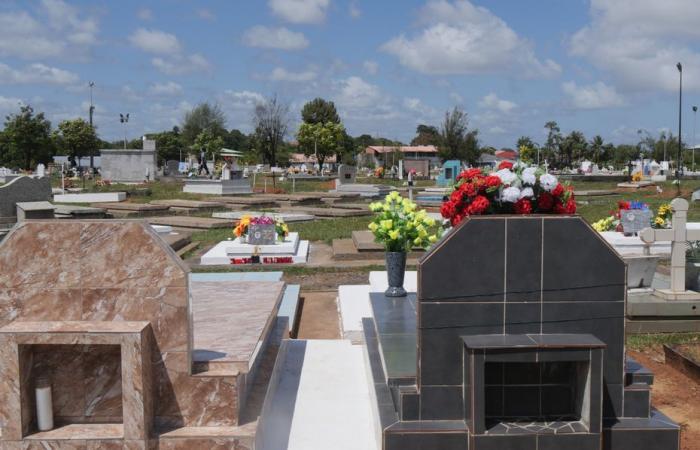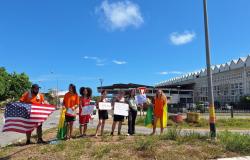Support for families, management of concessions, anticipation of demographics… For Guyanese town halls, taking care of cemeteries is a full-time job, which goes well beyond All Saints' Day.
From the first light of dawn on All Saints' Day, the Cabassou cemetery in Cayenne welcomed families coming to pray with their loved ones and decorate their graves with flowers.
In the alleys, Joséphine Metella Diaye, head of the “cemeteries unit” at the municipality, checks that everything is going well. As usual, she coordinates the teams and responds to requests from residents, seeking to know where their loved ones are buried.
But for her, as for all Guyanese municipal teams, the management of cemeteries is far from being restricted to November 1st.
“Whether before death, during death or after death, we must help families take the necessary steps, particularly helping those for whom it is a first death and who are a little disoriented”
Joséphine Metella Diaye, in charge of the two cemeteries of Cayenne
One of these daily tasks is, for example, to ensure that the person has the right to be buried in Cayenne – if they resided and died in the commune or if they have a family concession in a of the two municipal cemeteries – and if necessary, to find a free place.
An increasingly complicated job as the population increases. So while the city has a little more than 45,000 concessions, the town hall of Cayenne is considering opening a third cemetery, the one located on rue d'Estrées being already saturated, and that of Cabassou on the verge of being so in the next few years.
The town hall has also initiated procedures to renew abandoned concessions. “These are the concessions that have not been maintained for more than ten years. We notify the family, and if they do not respond within a year, we can recover the concession, place the bones in the ossuary and grant it to another family. explains the person responsible for the cemeteries of the capital city.
This problem arises throughout Guyana, including very attractive, more rural municipalities such as Roura, a commune with 4,000 inhabitants compared to 3,400 in 2021, or Macouria, whose population has doubled in a decade, reaching around 19,000 inhabitants.
“In Cacao, we have a cemetery planned because for the moment the dead are buried in private residences. As for the Roura cemetery, it is unfortunately too small so we are in discussions with a family owning adjoining private land, with a view to recovering it and expanding the cemetery”
Jean-Claude Labrador mayor of Roura.
The management of graves also has a cost for municipalities, they being under the legal obligation to take care of “people without sufficient resources” (PDRS), those who were formerly called the “indigent”, n having no loved ones able to take care of their funerals.
“All those who die at the Cayenne hospital and are then dropped off at the Cayenne morgue are taken care of by the town hall, it is a legal obligation and like many people from the interior municipalities are taken care of and die in Cayenne, we are particularly concerned”
Joséphine Metella Diaye, head of the cemetery unit at Cayenne town hall
Between demographic pressure, the increase in the number of people in very poor situations, and the Covid-19 epidemic, the number of people who cannot be cared for by a loved one has continued to increase these recent years. For example, Cayenne's budget dedicated to caring for these indigent people increased from 65,000 euros to 150,000 euros, between 2023 and 2024, according to the town hall.






